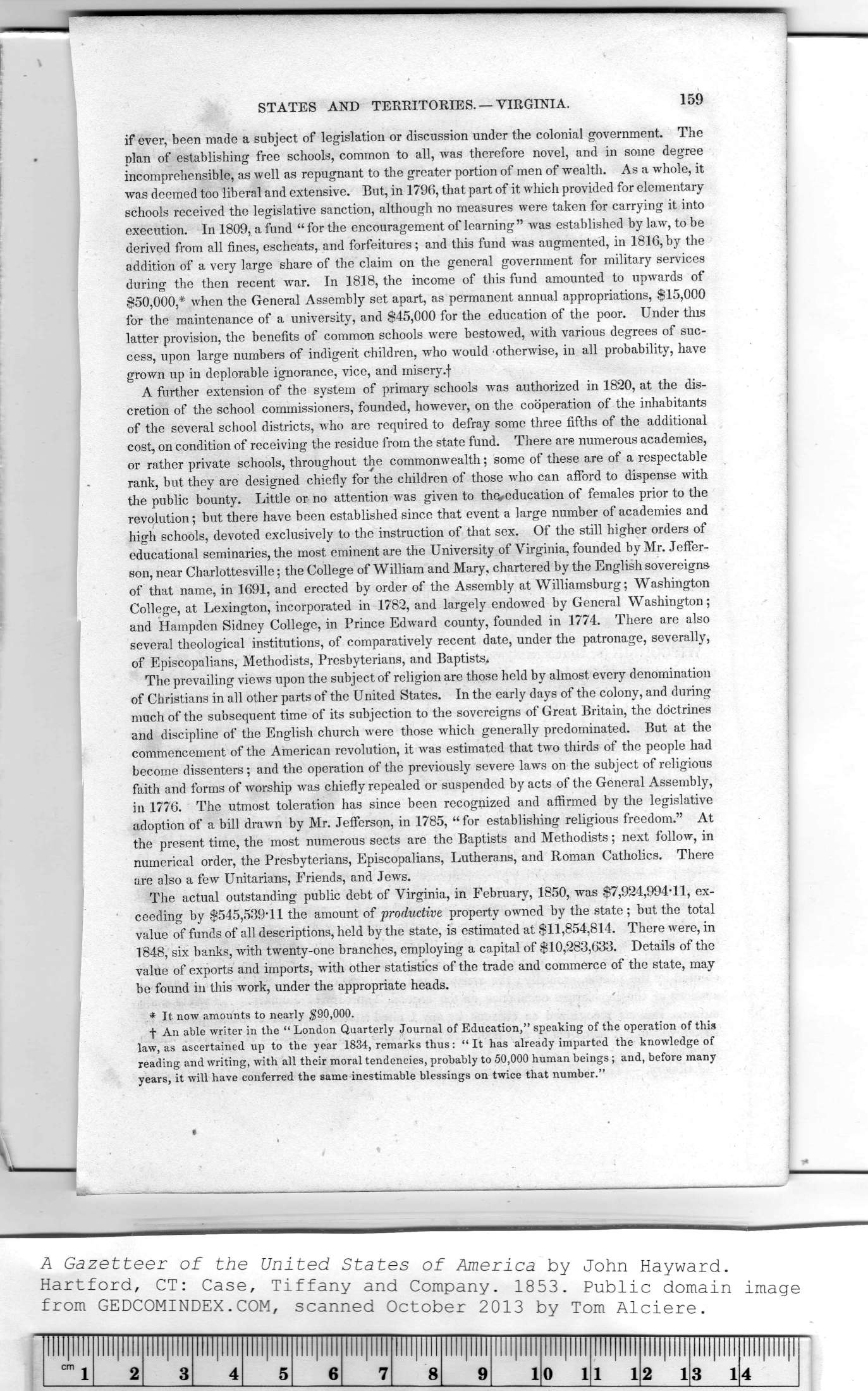|
|
Note: Ctrl and + increases the font size of the text below, Ctrl and - decreases it, and Ctrl and 0 resets it to default size.
STATES AND TERRITORIES. — VIRGINIA. 159
if ever, been made a subject of legislation or discussion under the colonial government. The
plan of establishing free schools, common to all, was therefore novel, and in some degree
incomprehensible, as well as repugnant to the greater portion of men of wealth. As a whole, it
was deemed too liberal and extensive. But, in 1796, that part of it which provided for elementary
schools received the legislative sanction, although no measures were taken for carrying it into
execution. In 1809, a fund “ for the encouragement of learning" was established by law, to be
derived from all fines, escheats, and forfeitures; and this fund was augmented, in 1816, by the
addition of a very large share of the claim on the general government for military services
during the then recent war. In 1818, the income of this fund amounted to upwards of
$50,000,* when the General Assembly set apart, as permanent annual appropriations, $15,000
for the maintenance of a university, and $45,000 for the education of the poor. Under this
latter provision, the benefits of common schools were bestowed, with various degrees of suc-
cess, upon large numbers of indigent children, who would otherwise, in all probability, have
grown up in deplorable ignorance, vice, and misery.f
A further extension of the system of primary schools was authorized in 1820, at the dis-
cretion of the school commissioners, founded, however, on the cooperation of the inhabitants
of the several school districts, who are required to defray some three fifths of the additional
cost, on condition of receiving the residue from the state fund. There are numerous academies,
or rather private schools, throughout the commonwealth; some of these are of a respectable
rank, but they are designed chiefly for the children of those who can afford to dispense with
the public bounty. Little or no attention was given to the* education of females prior to the
revolution; but there have been established since that event a large number of academies and
high schools, devoted exclusively to the instruction of that sex. Of the still higher orders of
educational seminaries, the most eminent are the University of Virginia, founded by Mr. Jeffer-
son, near Charlottesville; the College of William and Mary, chartered by the English sovereigns
of that name, in 1691, and erected by order of the Assembly at Williamsburg; Washington
College, at Lexington, incorporated in 1782, and largely endowed by General Washington;
and Hampden Sidney College, in Prince Edward county, founded in 1774. There are also
several theological institutions, of comparatively recent date, under the patronage, severally,
of Episcopalians, Methodists, Presbyterians, and Baptists.
The prevailing views upon the subject of religion are those held by almost every denomination
of Christians in all other parts of the United States. In the early days of the colony, and during
much of the subsequent time of its subjection to the sovereigns of Great Britain, the doctrines
and discipline of the English church were those which generally predominated. But at the
commencement of the American revolution, it was estimated that two thirds of the people had
become dissenters; and the operation of the previously severe laws on the subject of religious
faith and forms of worship was chiefly repealed or suspended by acts of the General Assembly,
in 1776. The utmost toleration has since been recognized and affirmed by the legislative
adoption of a bill drawn by Mr. Jefferson, in 1785, “for establishing religious freedom." At
the present time, the most numerous sects are the Baptists and Methodists; next follow, in
numerical order, the Presbyterians, Episcopalians, Lutherans, and Roman Catholics. There
are also a few Unitarians, Friends, and Jews.
The actual outstanding public debt of Virginia, in February, 1850, was $7,924,994-11, ex-
ceeding by $545,539-11 the amount of productive property owned by the state ; but the total
value of funds of all descriptions, held by the state, is estimated at $11,854,814. There were, in
1848, six banks, with twenty-one branches, employing a capital of $10,283,633. Details of the
value of exports and imports, with other statistics of the trade and commerce of the state, may
be found in this work, under the appropriate heads.
* It now amounts to nearly $90,000.
f An able writer in the “ London Quarterly Journal of Education," speaking of the operation of this
law, as ascertained up to the year 1834, remarks thus: “ It has already imparted the knowledge of
reading and writing, with all their moral tendencies, probably to 50,000 human beings ; and, before many
years, it will have conferred the same inestimable blessings on twice that number."
|
Illllllll |
Illllllll |
Illllllll |
Illllllll |
Illllllll |
Illllllll |
Illllllll |
Illllllll |
Illllllll |
Illllllll |
Illllllll |
Illllllll |
Illllllll |
Illllllll |
!lll|l!ll|l |
|
1 |
2 |
a |
4 |
5 |
6 |
7 |
8 |
9 |
1 |
0 1 |
1 1 |
2 1 |
3 1 |
4 |
|
